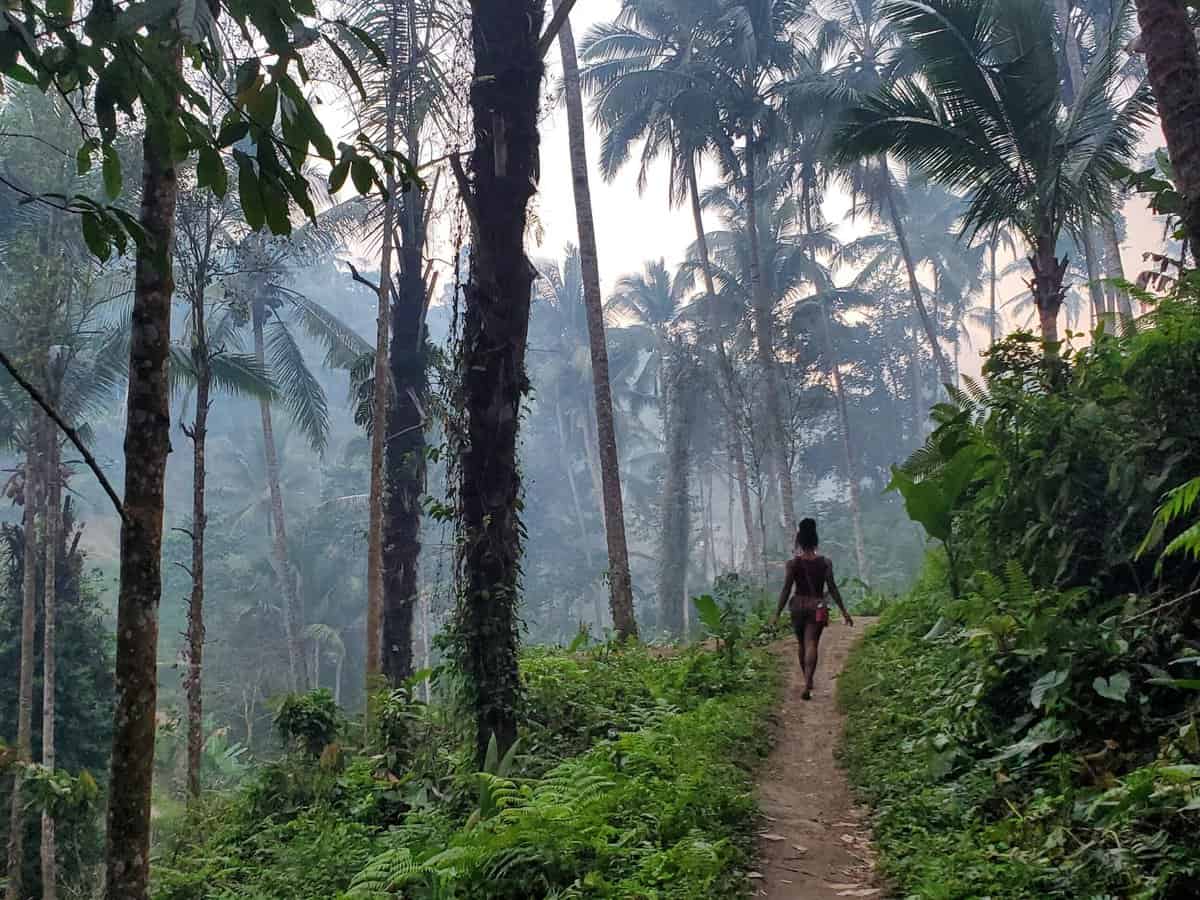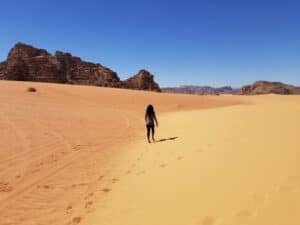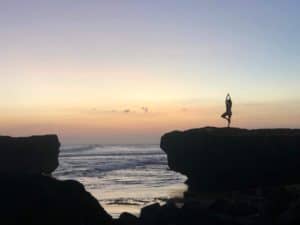The Wisdom of Nyepi: 6 Life Lessons I Learned From Bali’s Day of Silence

I don’t know if I’m the only one who’s noticed this, but children seem to go out of their way to make as much noise as they possibly can, much to the dismay of any adults within earshot.
Children make so much noise unintentionally, intentionally, and obliviously, it’s as if they believe instinctually that making noise is essential to their survival.
When I was a child myself, I was not exempt from this phenomenon, and my love for noise persisted through my teens and twenties.
I used to think there was something so boring, sad, and lifeless about silence.
It was noise that gave life energy.
It was noise that gave you a stimulus from which to feel happiness.
Everything fun involved noise–theme parks, movies, music…
Every time I would get in the car with my mom, I would turn on the radio to my favorite station and start my usual sing-and-dance-along.
Then, not even a full song into my concert, my mom would inevitably tell me to turn off the music.
(Well, she actually didn’t call it “music,” she called it “noise”).
I would obey.
But I had a plan.
As requested, I’d turn the music all the way down.
But every few minutes, I would turn it up one or two more notches, all the while continuing conversation with her.
My plan was–much like boiling a lobster–to turn it up so gradually (while simultaneously distracting her) that she wouldn’t even realize what was happening.
If I was patient enough and stealthy enough, eventually, the music would once again get back loud enough for me to rock out to.
The day I grew up
I looked forward to the times I would be in the car alone because then I could go full concert the entire time with no resistance or disturbance.
I knew something changed in me when one day I found myself in the car alone, and I intentionally kept the music off.
According to science, puberty happens around your teenage years, but that’s biological puberty.
I think real puberty, psychological puberty, the real transition from childhood to adulthood, is when you start to prefer silence over noise.
One day, all of a sudden, I was no longer the person carelessly and obliviously making all the noise.
I was now the person who was ultra sensitive to all the noise.
I was now the person who enjoyed silence.
So when I found out I would be in Bali for Nyepi, the day of silence, I was ecstatic.
Expectations…
As someone who hates overstimulation and constantly complains about distraction, external stimuli, and outside inputs, on paper, me and Nyepi were going to be two peas in a pod.
It’s an entire holiday where everything is shut down.
Stores and restaurants are closed, the airport even closes and there are no flights into or out of Bali, and the roads are empty.
It is enforced that you stay in your house, where you are supposed to refrain from using electricity.
This means no TV, no phone, no internet, no social media, no Netflix, and no lights other than the natural light from the sun.
It’s a day where you are supposed to sit in stillness and silence and reflect.
I was very much looking forward to Nyepi.
I was looking forward to an excuse to get off the hamster wheel of my regular responsibilities, tasks, and to-dos.
I was looking forward to a pause from the worries and anxieties that play themselves on repeat in my head.
I was looking forward to a break from my life’s alleged urgencies–both real and imagined.
This was going to go great.
I envisioned myself–for 24 hours–sitting cross legged, eyes closed, in the same spot, emanating peace and reaching enlightenment.
That didn’t seem too realistic, so I switched to a new vision.
I would have multiple cycles of a routine of reading, meditating, and writing, collectively spending multiple hours doing each, meanwhile being flooded with inspiration.
Yes, this plan would work.
I would be overwhelmed with a flow of ideas that would turn into Pulitzer Prize level writing.
All the solutions to my problems would bubble up from my subconscious and make themselves plain.
In this 24-hour period, I was going to make tremendous strides towards progressing my creative career, my mental acuity, every area of my life, and of course the state of the world while I’m at it.
It was going to be overwhelming, but I could take it.
The influx of ideas and inspiration would be enough to give you whiplash, but I was ready to receive it with literal open arms.
I was ready to be a vessel for the infinite to flow through me.
I was the chosen one.
At least on this particular day I was going to be.
And all of this would be happening with an involuntary smile on my face.
There would be an invigorating buzzing in my body and a halo of light around my energetic field.
It was going to be the most transformational 24 hours of my life.
I would never be the same.
Decidedly, this was going to be my Nyepi.
…vs Reality
It started off great.
I immediately noticed the benefit of the outer silence more so than the inner silence.
There was no noise of hundreds of motorbikes whizzing by, horns honking, or people talking.
Even the countless stray dogs that usually fill the streets with their howls and incessant barking (and poop) seemed to get the memo and seemed to have been observing the holiday.
With my full tank of enthusiasm, I began my first enlightenment cycle.
I started reading a nonfiction book, was excited about the things I was learning, and took copious notes.
But with every passing 20 minutes or so of continuous reading, I started to lose more and more enthusiasm for that task.
In search of a dopamine hit, I started reading a different book in an effort to reset my enthusiasm.
It worked for a moment, but after a few minutes, the excitement of starting something new waned, and my enthusiasm for reading at all deteriorated even faster than it did for the first book.
Okay, time to change activities, altogether.
Next up on my enlightenment to-do list was meditating.
Without hesitation, I stupidly confidently set my timer for 40 minutes.
Now, mind you, I haven’t really meditated in like months.
But for some reason, I thought I was just gonna go straight to 40 minutes because I mean, I have nothing else to do today.
So really, considering that, I could have set it for 3 hours, but I settled on a measly 40 minutes.
Sound logic, right?
Go time.
The timer was now set.
I started to feel myself drifting off to sleep…for the third time.
And this was only 15 minutes into the meditation.
This was the meditation session that I was convinced was going to result in a flood of enlightenment, clarity, and self discovery, was going to provide the answer to all of life’s burning questions, and was going to provide the ideas that would form the foundations of my next best-selling books.
But all I did so far was nod off a couple times.
I decided maybe it’s not the best time to meditate.
Since I’m kind of getting sleepy, I’m not getting much out of this, so no need to waste time forcing it if I keep nodding off.
It had only been a couple hours since I’d woken up, so I felt too guilty to take a nap, so I was like, maybe I’ll do something a little more active.
Maybe I just need something more stimulating.
Time to begin the writing portion.
So I pulled out my journal and pen.
And I started writing.
Poorly.
Very, very poorly.
Nothing seemed good.
Of course, nothing had to be good.
I mean, I’m just writing in my journal.
But I didn’t want to just write in my journal–I wanted to write something that would be good enough to publish.
And when I wasn’t getting that, my mind wouldn’t shut up about it.
The creative devil on my shoulder would say, “Girl, this isn’t any good.”
Then the creative angel on my other shoulder would pop in and say, “It’s okay. It doesn’t have to be good.”
The creative devil would say “Do us all a favor, and stop.”
The creative angel would say “Keep going. You just need to dust off the cobwebs.”
The creative devil would say, “Maybe the last good thing you wrote is just going to be the last good thing you’ll ever write.”
The creative angel would say, “You have proven to yourself time and time again that if you keep writing badly for long enough, good writing will show up.”
Well…the creative devil won.
All that shitty writing and self deprecation officially zapped the last of my energy.
I tried one last hail Mary in an effort to stay awake.
Instead of trying to stay focused enough on my own writing until I can make it good, I decided to go back to reading someone else’s writing that’s already good.
I started my third book of the day.
Then almost immediately after, my consciousness finally gave out and I fell completely asleep.
I woke up.
And it was dark.
The sun had already gone down.
Night had already fallen.
My first thought was, Thank God, this is almost over!
Then my second thought was, Wait, what about my enlightenment??
I didn’t get all the answers.
Nyepi can’t be over already!
All the puzzle pieces of my life didn’t fall into place yet!
I was disappointed because the sun already being down meant that time was up and I didn’t get as much done as I wanted to (on a day that’s supposed to be about doing nothing).
Welp, I didn’t get all the answers to all my problems, the basis of a New York Times bestselling book, nor reach enlightenment, so what did I get from this?
01 / Resistance to stillness is telling.
We claim we want to sit still.
But do we?
We say we long for the opportunity to pause.
We want to rest.
But then we do, and we go crazy.
I was excited for an excuse to stop and just connect with myself, reflect, and create without the pull from technology or distraction.
I looked forward to tearing myself away from my everyday to do’s and responsibilities that always seem so urgent and pertinent to continuing to keep everything running.
But I woke up, on “the big day,” knowing that I had “nothing to do,” immediately looking forward to a nap.
I woke up bored–still naively optimistic about how the day could go, but also already bored.
But what I called boredom, was really an aversion to where my experience was about to take me.
Boredom is the absence of an external stimulus to provide us distraction from having to sit with ourselves and our deeper, uglier thoughts we don't want to think, emotions we don't want to feel, fears and anxieties we don’t want to indulge, and unresolved issues we don't want to contend with.
I yearned for stimulation, physical activity, movement, social interaction, just for the sake of having something else to do other than sit with my own thoughts and feelings.
The silence that I thought would be filled solely with inspiration and answers, was instead filled with self doubt and self deprecation.
I felt myself yearning for distraction, yearning for something that would make me not have to feel so inadequate, something that would free me from my own self judgment.
When you are avoiding stillness or silence, ask yourself why.
(Ironically, this will require stillness and silence to do.)
And the next time you find yourself saying you’re bored, peel that back further–what emotions and thoughts are arising in you when you feel “bored”?
02 / Don’t wait to be forced to take a break.
So many of us feel stuck on the treadmill of responsibility–beholden to the daily routines, habits, and actions that we participate in to keep ourselves, the people around us, and our livelihoods going.
What happens if we pause?
We fear we will spontaneously combust and everything around us will instantaneously crumble.
So we just keep going, until we ourselves instantaneously crumble.
We push ourselves to the point where we do spontaneously combust and burn out–which could have been avoided if we’d just voluntarily taken time to pause instead of waiting until we were involuntarily forced to by circumstance, or our now failing physical, mental, and emotional health.
It’s interesting how everything that we’re constantly doing feels urgent until something else comes in, and makes it not so.
Something like a health scare, a family emergency, or a government mandated holiday forces us to pause, and proves that what we thought was so urgent, 99% of the time really isn’t.
Funny how when we are finally forced to pause in our world, to our surprise the world keeps spinning, and we’re able to pick up where we left off.
You don’t need to wait for external excuses and outside permission to come along to qualify as a “real” or “valid” reason to pause. Your internal need and desire to take a break is valid enough reason to do so.
03 / Silence must be habitual to be beneficial.
If you are used to going a million miles per hour and being constantly bombarded with external stimuli, the first time you try to deliberately sit in silence, you will face resistance.
It won’t be easy, and not only will it not feel good, it will feel like agony to your mind.
But it gets easier the more you do it, and you get more benefits out of it the longer you do it.
Silence does provide the benefits I was expecting to experience–clarity, inspiration, creative invigoration, mental rejuvenation–but only for the person who is able to sit still long enough (physically and mentally) to extract those benefits.
The ability to persist peacefully through stillness can be built by consistently practicing stillness in small chunks, gradually increasing over time.
As someone who prides themselves in not liking distraction, and in loving silence and slow, simple living, my God, a full day of that was absolute torture.
Sure, it was only one day out of the year.
You would think a ratio of 364:1 days of chaos to silence would be manageable, but I found the day to be too large a unit of time for me to sit within that experience and enjoy and benefit from it.
Maybe you would like to have a full day of Nyepi every week.
Or maybe you don’t need a day of Nyepi, but moments of Nyepi within your days.
You can start with 5, 10, or 15 minute chunks of time reading, journaling, or meditating, do that daily, and if desired or necessary, increase the amount of time gradually.
04 / Polarity is the spice of life.
Oscillation between opposites helps you to appreciate both sides and both extremes of an experience.
A cool rainy day is more appreciated after a hot sunny day. And vice versa.
A long night’s rest feels better after a long day’s work. And vice versa.
Stillness is only enjoyable as a refuge from activity. And vice versa.
It’s the opposites that make it possible for us to enjoy both ends of the spectrum.
Too much of anything, even if it’s a “good” thing is bad.
When we live with the scales tipped too far in one direction, it hinders us from enjoying our experience.
During Nyepi, I realized that rather than having an entire day devoted to one thing/nothing, I like to have more variety built into my day.
While I often crave silence, binging silence was too much for me.
I just need a taste at least every other day, otherwise the silence that should be enriching, just feels boring.
When you are figuring out how to work silence and stillness into your regular routine, do so at an amount and cadence that works for you and still allows you to enjoy both the stillness and its opposite.
05 / People respond to their environments.
Ahh…Bali.
The island of beautiful beaches, stunning sunsets, cold coconuts, expansive rice fields, and most of all–peace.
This all exists, yes, but it exists in pockets outside of the more populated areas.
If you happen to live in the more populated areas (like moi), instead of the perpetually quiet island paradise, you will experience perpetual traffic, noise, and dare I say, chaos.
But what I found interesting was that on the day of silence, where businesses were closed, streets were empty, and all the people were quiet, even the stray dogs that were usually roaming the streets in packs, obnoxiously barking and howling ceaselessly, were quiet.
If the dogs were even quiet on the day of silence, what does that mean?
We unconsciously respond to the energy and activity of our environments, so you need to be deliberate about either changing or choosing your environment to suit your life’s vision.
This may mean you need to change things within your present environment, or move to a new environment altogether.
If you want to work in a certain industry, it behooves you to be in certain areas where that industry is thriving.
If you want to meet certain types of people, it behooves you to put yourself in the environments where those people are.
If you want to have certain habits, it behooves you to add certain things to your environment that would be conducive to those habits, and remove certain things from your environment that would be detrimental.
This is why I don’t keep the TV or the news on in my home.
I want to think positively and clearly, and live open to people and experiences, and not live in a constant state of fear and anxiety and pessimism.
This is why when I initially set out on my digital nomad journey, I moved to Chiang Mai, Thailand, which at that time was known as the digital nomad capital of the world.
I wanted to be surrounded by people who had the same goals, and who were further ahead than me on the new path I was on.
This is why I splurge on an upscale gym membership.
I want to be surrounded by people who have high standards for themselves, prioritize their health, and are successful enough in their chosen fields to have enough disposable income to afford something others might see as a waste of money, and I want to be in an aesthetically pleasing environment that makes me feel good and motivated.
Environment matters. Change or choose it wisely.
06 / You don’t have to always produce.
It’s interesting how I took a day about doing nothing, and made it about doing something.
And further, when I didn’t get that “something” that I was expecting, I was disappointed in myself…for not being productive on the day that I was supposed to do nothing.
It’s one thing to be mad at yourself for not doing something well enough, but it’s a whole ‘nother level to be mad at yourself for not doing nothing well enough.
Sometimes, it’s okay to do things with no desired outcome.
Sometimes, it’s essential to do things with no desired outcome, so you don’t train yourself to believe that you have to extract tangible, measurable value out of your every action in order for it to have been a worthy use of your time.
Everything does not have to be performative or productive.
Sometimes it’s okay to just be.
Don’t be hard on yourself if everything you do does not result in some sort of tangible output.
And don’t multi-task.
If it’s time to work, work.
If it’s time to play, play.
If it’s time to rest, rest.
The more you try to get out of a single experience, the more you dilute the potency of that experience.
If you enjoyed reading this article as much as I enjoyed writing it…
Every new subscriber gets a free habit tracker & you’ll never miss another mindset shift! It’ll be your favorite email you get every week 😊



